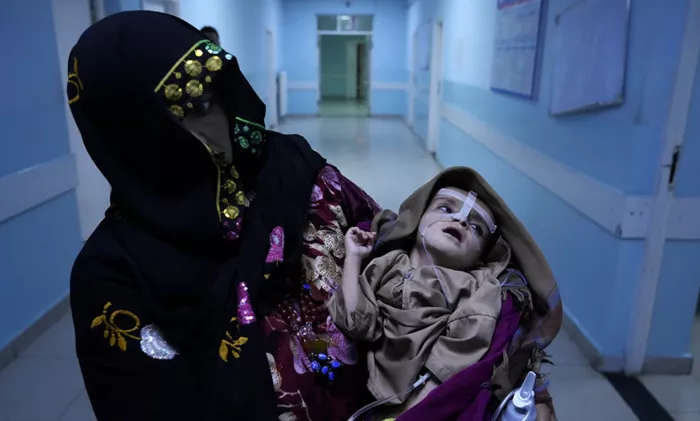“This feels like doomsday. I am overwhelmed with grief. Imagine watching your children die,” says Amina, a mother who has lost six children, none of whom lived past three years old. Now, her seven-month-old daughter, Bibi Hajira, is in critical condition.
Bibi Hajira, who is the size of a newborn due to severe acute malnutrition, shares a bed in the Jalalabad Regional Hospital in Nangarhar province, Afghanistan. Her condition is dire, and Amina laments, “My children are dying because of poverty. I can only feed them dry bread and water warmed under the sun.”
Amina’s heartbreak is not an isolated case. Bibi Hajira is one of 3.2 million Afghan children suffering from acute malnutrition. This crisis, fueled by decades of war, extreme poverty, and recent Taliban rule, has reached unprecedented levels.
Inside the hospital, the situation is grim. In a ward meant for seven beds, 18 toddlers are crowded together. The room is eerily silent, save for the beeping of medical equipment. Many children are awake but too weak to move or speak.
Three-year-old Sana, who shares a bed with Bibi Hajira, is cared for by her aunt after her mother died during childbirth. Sana’s aunt, Laila, sadly displays seven fingers to represent the number of children she has lost.
Nearby, three-year-old Ilham, who is severely underweight and suffering from skin peeling, has also lost his sister to malnutrition. One-year-old Asma, with her hazel eyes and long eyelashes, struggles with septic shock. Dr. Sikandar Ghani, overseeing her care, doubts her survival. Asma’s mother, Nasiba, is distraught, having already lost three children. She mourns, “It feels like my flesh is melting. I cannot bear to see her suffer.”
In the past six months, the hospital has seen 700 child deaths, averaging more than three per day. Without the support from the World Bank and UNICEF, the death toll would likely be much higher. Previously, international funding covered nearly all public healthcare in Afghanistan, but since the Taliban’s takeover, funds have been cut due to sanctions, leading to a healthcare collapse.
Aid agencies have stepped in with temporary emergency responses, but these are unsustainable. The Taliban’s policies, including restrictions on women, have further discouraged international donors. Hamdullah Fitrat, the Taliban government’s deputy spokesman, calls for increased humanitarian aid, separate from political issues.
Our visits to numerous health facilities over the past three years reveal a deteriorating situation, but also demonstrate that proper treatment can save lives. Dr. Ghani notes that with more resources, more children could be saved. Despite the challenges, healthcare workers remain committed to their patients.
Malnutrition is not the only cause of child mortality; other preventable diseases also contribute. In the intensive care unit, six-month-old Umrah struggles with severe pneumonia. Her mother, Nasreen, is heartbroken and fears for her child’s life. Two days after our visit, Umrah passed away.
These heart-wrenching stories highlight the severe strain on Jalalabad hospital, which serves a population of approximately five million across five provinces. The situation is exacerbated by over 700,000 Afghan refugees who have been deported from Pakistan and now reside in Nangarhar.
The UN reports that 45% of Afghan children under five are stunted. Robina, a mother from Sheikh Misri, worries about her two-year-old son, Mohammed, who is significantly shorter than his peers. With inadequate resources, she struggles to afford treatment. “We could have treated him if we were still in Pakistan,” she says.
UNICEF warns that stunting can cause severe, irreversible physical and cognitive damage. Dr. Ghani emphasizes the need for immediate intervention to prevent long-term harm.
Community nutrition programs, crucial for addressing malnutrition, have faced significant funding cuts. Despite receiving only a fraction of the necessary funding, timely interventions have proven effective. Sardar Gul, who has two malnourished children, reports improvement in his son Mujib after receiving aid.
These stories underline the urgent need for increased support and resources to address Afghanistan’s child malnutrition crisis and prevent further suffering and loss of life.


